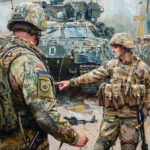Countries Face Pressure to Pick Sides in U.S.-China Trade War

Countries Face Pressure to Pick Sides in U.S.-China Trade War
Beijing and Washington are putting third parties in a painful position.
Chinese President Xi Jinping waves as he arrives in Hanoi for a two-day state visit on April 14. Athit Perawongmetha/AFP via Getty Images
Welcome to Foreign Policy’s China Brief.
The highlights this week: The U.S.-China trade war puts other countries in a painful position, the death of Pope Francis jeopardizes a Chinese agreement with the Vatican, and Chinese food delivery apps battle for business.
Welcome to Foreign Policy’s China Brief.
The highlights this week: The U.S.-China trade war puts other countries in a painful position, the death of Pope Francis jeopardizes a Chinese agreement with the Vatican, and Chinese food delivery apps battle for business.
U.S. and China Put Pressure on Trade Partners
With no clear end in sight to the U.S.-China trade war, both countries are trying to strong-arm third parties into taking sides. The United States is promising possible reductions to tariffs—currently set at a universal 10 percent, until the 90-day pause ends in July—for countries that are willing to restrict Chinese trade and investment.
China, meanwhile, has warned that it “firmly opposes any party reaching a deal at the expense of China’s interests. If such a situation arises, China will not accept it and will resolutely take reciprocal countermeasures.” Chinese experts have also called for other countries to “withstand pressure from the Trump administration.”
Official language from Beijing emphasizes that surrender is not an option: “Negotiating with a tiger will only lead to being devoured by the tiger, and resolute struggle is the only way to win the future.” China has also called on the international community to not “sit idly by in the face of the United States’ hegemonic and bullying behavior.”
But at the same time, Beijing has been throwing its weight around trying to forestall others from making deals with Washington, including restrictions on exports to the United States of South Korean goods made with Chinese rare earths.
This competition leaves the rest of the world in a painful position. The U.S.-China rivalry was once a source of leverage for countries looking for foreign aid and investment—but now Washington is offering sticks instead of carrots, and Beijing seems poised to follow.
In particular, Southeast Asian countries such as Cambodia and Vietnam can’t afford to give up U.S. exports, but they also can’t afford to lose Chinese investments. They might be willing to make token gestures to appease Washington, but they ultimately won’t move away from Beijing. Their most likely course is to try to steer closer to the United States on trade demands while offering China increased security cooperation to compensate.
The Trump administration, meanwhile, claims to be in trade negotiations with more than 70 countries. But even under normal conditions, trade deals require roughly 18 months to negotiate and 45 months to implement. Doing 70 deals at once, especially with a depleted and inexperienced team of U.S. officials, is a virtual impossibility.
Prospects for a U.S.-China deal have been damaged by the intemperate language used by the Trump team and other Republicans. Vice President J.D. Vance’s use of the term “Chinese peasants,” for instance, has reverberated around the Chinese internet, which sees it as a contemptuous insult.
China remains open to a deal, and Chinese diplomats and economists have been looking for serious people to talk to on the U.S. side. It’s possible that they may find some: Both Treasury Secretary Scott Bessent and Commerce Secretary Howard Lutnick seem open to negotiating, since they played a significant role in persuading President Donald Trump to pause his so-called reciprocal tariffs on April 9.
At a private meeting with investors on Tuesday, Bessent called the trade war unsustainable and said de-escalation will come. Rationally, he is right. An already wobbly U.S. economy cannot afford a full decoupling from the world’s second-largest economy and main manufacturer. And the Chinese economy—still staggering from the COVID-19 pandemic and a burst real estate bubble—can’t afford to lose its main export market.
But these are not rational times, and any deal must go through the court of a president who wants everything to be about him.
What We’re Following
Pope’s death imperils deal. China sent condolences to the Vatican after the death of Pope Francis on Monday. But with Francis gone, a key deal may be in jeopardy. There are effectively two Chinese Catholic churches, though believers often overlap: the Chinese Catholic Patriotic Association (CCPA), which is approved by Beijing, and the underground Catholic Church, which is recognized by the rest of the world.
Persecution of Christians has increased under Chinese President Xi Jinping, but last year Beijing and the Holy See extended a 2018 agreement that gives the Vatican some input on the selection of bishops within the CCPA. The full text of the deal is not public, but the Vatican accused China of violating it in 2022.
Human rights advocates criticized Francis, who supported the deal in the hope of protecting Chinese Catholics, for ignoring the plight of other minorities in China and making a deal that they say is effectively capitulation to the Chinese Communist Party. The next pope may see things differently.
Ukraine and China spar. After accusing China of turning a blind eye to Chinese mercenaries fighting for Russia, Ukrainian President Volodymyr Zelensky has said China is also supplying weapons to Russia and overseeing weapons manufacturing on Russian soil.
China, which says it is committed to peace in Ukraine but has supported Russia in practice, called the accusations “groundless.”
Individual Chinese entrepreneurs have certainly taken advantage of Russia’s military needs, and it’s possible that Beijing is, too. But Kyiv hasn’t yet made public the evidence Zelensky claims to have, and he could be trying to leverage anti-China feelings in the Trump administration to get more support.
FP’s Most Read This Week
- Why Beijing Is Standing Up to Trump by Deng Yuwen
- Why Authoritarians Attack Universities First by John Haltiwanger
- Why Beijing Thinks It Can Beat Trump by Scott Kennedy
Tech and Business
Freight impact. The slow-moving iceberg of the U.S.-China trade war is beginning to crash into business, as freight shipments across the Pacific Ocean drop. As of last week, 80 blank sailings—meaning canceled ones—had been recorded since tariffs were announced, totaling around 640,000 to 800,000 shipping containers.
It’s not just the businesses that rely on imports that are taking a hit—it’s the whole transport chain. People working in the U.S. trucking industry, which relies on the daily business of bringing containers from ports to retailers, are starting to panic.
Trade tends to find a way, however. Though the global scope of U.S. measures has diminished the utility of transshipment to avoid tariffs on China, U.S. consumers have honed in on the Chinese e-commerce app Dunhuang (known as DHgate in English), which sells goods directly from factories, to attempt to take advantage of Chinese manufacturing prices that remain below U.S. prices even with the tariffs.
Delivery price war. The stock prices of Chinese food delivery apps have plummeted as a vicious price war wages in the domestic market. Food delivery is extremely cheap in China, and it soared even higher during the pandemic, but the demand for food delivery is now declining as the economy stagnates.
Two of the biggest food delivery apps, JD.com and Meituan, are battling—and reportedly attempting to force drivers, most of whom switch between apps to seek the best-paying routes, to choose a side. That has caused a lot of bad PR; delivery drivers, who risked their health during the pandemic, are already going through hard times.
James Palmer is a deputy editor at Foreign Policy. X: @BeijingPalmer
More from Foreign Policy
-

An illustration shows a line of large shopping carts facing down a small Donald Trump figure holding two shopping bags. The stars of China’s flag are in the upper left corner. Why Beijing Thinks It Can Beat Trump
China’s elites have a new confidence in their own system.
-

U.S. Army Chief of Staff Randy George speaks to U.S. soldiers at the Hohenfels Training Area in southern Germany on Feb. 6. A Drawdown of U.S. Forces in Europe Is All but Certain
Here’s how the Pentagon can rebalance its approach to the continent without sacrificing U.S. interests.
-

University of California, Los Angeles students, researchers, and demonstrators rally during a “Kill the Cuts” protest against the Trump administration’s funding cuts on research, health, and higher education in Los Angeles on April 8. Why Authoritarians Attack Universities First
A Yale professor and expert on fascism talks about why he’s leaving the United States under Trump.
-

Dwight D. Eisenhower looks over a piece of paper while sitting on a couch as Robert Cutler looks over his shoulder. How Generations of Experts Built U.S. Power
And now Trump is throwing it all away.







Join the Conversation
Commenting on this and other recent articles is just one benefit of a Foreign Policy subscription.
Already a subscriber?
.
Subscribe
Subscribe
View Comments
Join the Conversation
Join the conversation on this and other recent Foreign Policy articles when you subscribe now.
Subscribe
Subscribe
Not your account?
View Comments
Join the Conversation
Please follow our comment guidelines, stay on topic, and be civil, courteous, and respectful of others’ beliefs.
Change your username |
Log out
Change your username:
CANCEL
Confirm your username to get started.
The default username below has been generated using the first name and last initial on your FP subscriber account. Usernames may be updated at any time and must not contain inappropriate or offensive language.